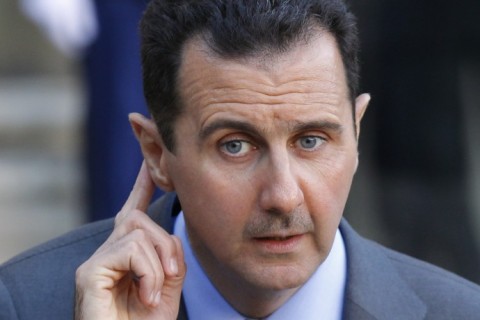Palmyra: Assad’s Easter gift, By Owei Lakemfa
Articles/Opinion, Featured Contributors/Columnists, Latest Headlines Saturday, April 2nd, 2016
Christians believe that Easter Sunday is Resurrection Day. For them, it is an annual celebration. In Lahore, Pakistanis of all faith trooped to a park to celebrate the day. As mainly children and women queued to buy tickets for a train ride at the park, a suicide bomber walked towards them and detonated a bomb. At least seventy two picnickers were murdered and 320 injured. At first count, thirty six of those murdered, were kids. Ten members of one family, all Muslims, were wiped out in the blast.
Ehsanullah Ehsan , spokesperson of a splinter group of the Pakistani Taliban — Tehreek-e-Taliban Pakistan Jamaatul Ahrar (TTP-JA) which claimed responsibility for the blast, said “Members of the Christian community who were celebrating Easter today were our prime target” Such is the voice and face of evil which picks the Christian Day of Resurrection to send many kids to early graves.
That same day, an army of primarily Muslim soldiers, despite losing 180 members, entered and retook the Biblical city of Palmyra, Syria, giving the city a rebirth. Palmyra is a symbol of faith being quite significant to all the main religions in the West and Middle East; traditional, especially Baal worship, Judaism, Christianity and Islam.
Palmyra, called Tadmur or Tadmor in the Bible was according to Second Chronicles 8:3-4, built by King Solomon as a fortress. It was a stronghold of the early Christians and Saint Paul was believed to be headed there to persecute Christians when on the road to Damascus, he saw a dazzling light and got converted. The Romans renamed it Palmyra (palm tree) The famous Church of St Simeon Stylites built in memory of a man said to have spent decades on a pillar proclaiming his Christian faith, can be found there. Later, Islam also came to the city.
For humanity, the importance of Palmyra is not religion, but its historical significance as it contains the ruins of an ancient city which includes theatres, temples, art and architecture dating back to the First Century. The historical site combines several civilizations; Syrian, Persian, Indian and Greco-Roman. It had whole ancient streets and structures intact. To ISIS, these historical sites were haram. So when in May 2015 it captured the city, its first acts were the execution of over 400 people mostly women and children, and the destruction of as many of the historical sites as possible. When manual destruction seemed slow, dynamites were used.
The commitment of the Bashar al-Assad administration to protect Christians and their sites is no fluke. It is a continuation of Syrian history which has seen that country become a model of religious tolerance in the Middle East. In fact, the ruling Baathist Party was established in 1947 by a Christian, Michel Aflaq, and many Syrians followed and accepted his leadership despite the fact the Christians are a minority. Following the crisis in the Baathist Party in 1962, Aflaq called a congress and his group won. The following year, the party overthrew the government and has been in power since then. Aflaq himself was ousted in an internal coup in 1966 and went into exile in Iraq.
But the guiding ideology has been radical, secular, Arab Nationalism. An ideology that recognizes no state religion and treats all Syrians as equal citizens. So, Syria guarantees a secular state in which everyone is free to practice, teach and evangelize without discrimination whether in terms of access to education, employment or social services. In contrast, many countries in the Middle East tend to discriminate or suppress minority religions. When the Saddam Hussein Government fell in Iraq, Christians became targets and over half a million of them fled to shelter in Syria. When mass protests brought change in Egypt and the Muslim Brotherhood under Mohammed Morsi took over, Christians were suppressed. So when a protest movement against the Assad Government started, the Church and majority Christians aware of the consequences for minority rights, campaigned for reforms, but not change of government. When war broke out, they flocked to the side of the Assad government.
The rebels especially the ISIS and al-Nusra pushed more Christians to the side of Assad with their policy towards Christians in areas they control. They gave non-Muslims three choices; convert to Islam, pay a religious levy called Jizya or be put to death. In many cases the option was either convert or be executed.
On September 11, 2014, a delegation of Eastern Christian Patriarchs paid President Barack Obama a visit in the White House to brief him on the situation in the Middle East. America was then contemplating bombing Syrian forces and establishing a so-called no-fly-zone to protect the rebels. His visitors were therefore taken aback when Obama confessed “We know that President Bashar al-Assad protected Christians in Syria.” One of the Patriarchs responded: “Then you should stop talking about a moderate Syrian opposition.”
But despite its many manifestations, the war in Syria is not religious . First, both sides in the conflict are primarily Muslims. Secondly, on the rebels side are stacked countries like United States and Britain which can be considered primarily Christian, and on the government side is Russia which has been a game changer. The Syrian War is about interests, influence and control; it is about local, regional and international politics.
If NATO had made the error of providing the rebels air support, it might have handed ISIS its first independent state. But three major realities are changing its position. First are the waves of refugees which have made falls in Europe and are threatening its demography. The second is the decisive intervention of Russia that has made the military defeat of the Syrian government an unlikely possibility. The third is the ISIS carrying out terrorist attacks in Paris and Brussels. So with time, the Syrian government is getting stronger. On the other hand, the international anti-Syrian coalition is scrambling to put together a so-called Anti-Terrorist Coalition against the same rebels they had trained and funded.
The al-Assad government might not be a model; but it is the most potent force on the battlefield that can checkmate and defeat ISIS.
Related Posts
Short URL: https://www.africanexaminer.com/?p=31460






















